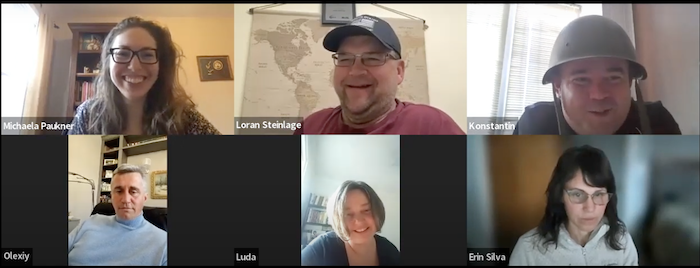www.no-tillfarmer.com/articles/12472-organic-no-till-helps-ukrainian-farmer-manage-minimal-moisture

Organic No-Till Helps Ukrainian Farmer Manage Minimal Moisture
In part 2 of this edition of No-Till Passport, Ukrainian farmer Olexiy discusses organic no-till & the challenges of farming during wartime.
May 12, 2023
In the second installment of No-Till Farmer’s Ask the Operator webinar series, 2023 Conservation Ag Operator Fellow Loran Steinlage of West Union, Iowa, welcomed Olexiy and Konstantin, two Ukrainian no-tillers, to discuss their no-till operations and the regenerative practices they’re experimenting with in Ukraine.
Olexiy farms over 7,000 acres in a region near the center of Ukraine and has been farming for 20 years. Every acre on his farm is organic and has been for the last 11 years. He has roughly 8 years of no-till experience, but it can be difficult and sometimes even impossible to completely eliminate tillage in his part of the world.
Even still, he and his colleagues have been doing a lot of experiments with organic no-till to find out what works in their climate and region.
Erin Silva, associate professor at UW-Madison and state extension specialist in organic and sustainable cropping systems, has been working directly with Olexiy to help provide additional insight and assist with on-farm experiments.
“So much is being done on farms with innovation, and talking to the folks in the Ukraine, it’s just amazing how much creativity and progress is being made,” Silva says. “We’re looking at what sorts of production, practices and modifications we need to make and partnering that with different equipment, especially when we’re talking about scaling up to more of the production scale that we see in Ukraine, as well as in the corn belt of the U.S.”
Silva and Olexiy have bounced thoughts off each other about different types of cover crops and different equipment approaches, such as strip-till and fertility.
“It’s been an incredibly valuable information exchange in terms of working together to bring organic forward while adding more cover crops to the system,” Silva says.
Organic No-Till in Ukraine
Olexiy first got interested in organic farming because he felt that he had learned a lot about no-till and organic farming was the next logical step for his operation. He had seen some farmers in his region try organic farming, but he knew he would have to get creative to do it successfully on such a large amount of acres. The other organic farmers he had encountered were mostly doing it as a hobby, and Olexiy knew that if he were to do it, it would have to become a full on business for him. Olexiy’s first step was to analyze organic no-till farming strategies from several different countries, and that is when Silva got in touch with him and offered help. They started to implement experiments with some of his acres, and while a lot of the experiments involved soybeans, sometimes they were experimenting with 2-3 different plants in one field. Another reason that organic no-till was a good option for Olexiy’s region is because of the scarce amount of rainfall that they get. And the rare times when they do receive a decent amount of rainfall, it is usually not during the growing season.Wartime Farming Challenges
The war in Ukraine has certainly presented some challenges for Olexiy, including export difficulties and the greater economic issues that stem from it. Bombs and tanks have also caused damage to some no-tillers’ fields, which has affected yield, according to Konstantin and Olexiy. “Some of the fields have so many bombs that it could take years to be able to return to the fields with a tractor and planter and get anything done effectively,’ Konstantin says. “And while some military personnel are able to locate and safely remove bombs using drones and metal detectors, one of the biggest problems is plastic bombs that cannot be easily located. It will take lots of time and lots of specialists to remove all of them, and even then, it will be difficult to say 100% that it is safe to farm.” Konstantin and Olexiy both agree that Ukraine is strong enough to win the war, but there is one thing Konstantin says he needs help with from someone in the U.S. With the excess of corn, wheat and other crops but an inability to export it all, he has come up with an idea to use that excess crop to produce bourbon. He hopes to find someone in the U.S. who can assist him with the logistics of this new business idea. For more information on his bright idea, as well as more details about the challenges of farming during wartime in Ukraine, check out part 1 of this edition of No-Till Passport.The No-Till Passport series is brought to you by Martin Industries.
Since 1991, Martin Industries has designed, manufactured and sold leading agriculture equipment across the U.S. and Canada. Known for Martin-Till planter attachments, the company has expanded to include a five-step planting system, closing wheel systems, twisted drag chains, fertilizer openers and more in their lineup. Their durable and reliable planter attachments are making it possible for more and more farmers to plant into higher levels of residue.
Related Content:
No-Tiller Shares Challenges of Farming in Ukraine During Wartime,
Brazilian No-Tiller Aims for Carbon Neutrality, Researchers Find Aphid-Resistant Wheat Varieties From Iran, Why No-Till Is the Future of Agriculture, No-Till Improves Soil Health in Western Asia

